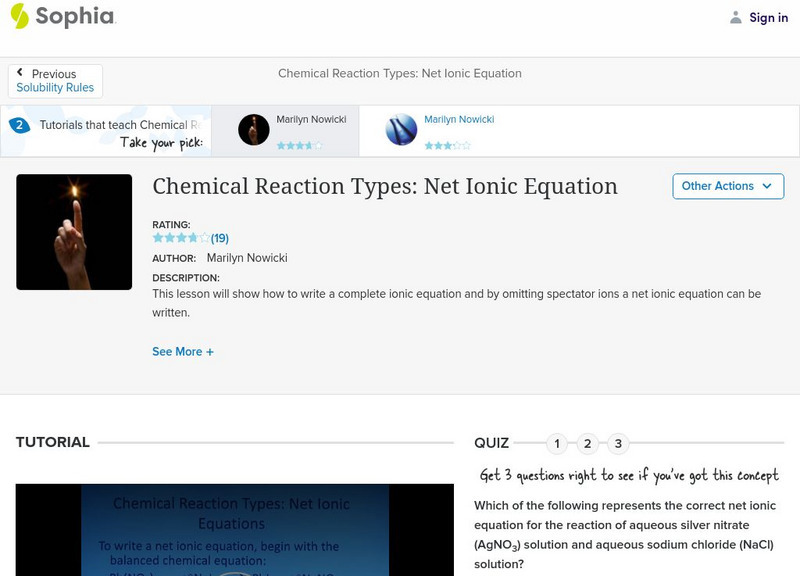Professor Dave Explains
Selective Precipitation
We know that insoluble compounds can form precipitates in solution when their constituent ions meet. But what if there are multiple possible precipitates? They actually may not all form at equivalent rates. We have to consult the Ksp...
FuseSchool
Making Hard Water Soft
Learn the basics about making hard water turn into soft water. What are the methods and techniques used to make that happen? Find out more in this video!
Professor Dave Explains
Predicting Precipitation With Ksp Values
Now that we know about the solubility product, it's time to learn about some applications for this concept. First, we can use this to predict whether precipitation will occur in a particular solution, and take measures to cause or...
FuseSchool
Learn How To Turn Hard Water Into Soft Water
If we want to use soap with water, it should ideally be with soft water. This video explains how Hard Water can be turned into Soft Water.
Curated Video
Preparation of Insoluble Salts: Using Solubility Rules and Filtration.
The video provides a detailed explanation of how to prepare a pure dry sample of an insoluble salt, specifically lead sulfate. The speaker first explains the solubility rules that determine whether a salt is soluble or not. Then, he goes...
Mazz Media
Signs of Chemical Reactions
Through real world examples, students will come to understand that chemical reactions cause reactants to undergo changes, so the products have different properties. Viewers will learn about single displacement and double displacement...
Visual Learning Systems
Reactions: Evidence of Chemical Reactions
Chemicals interacting with each other are one of the most fascinating topics in chemistry. Fireworks, burning flares, and rusting all illustrate chemical reactions. The different types of reactions are described, as well as the process...
Professor Dave Explains
Solution Chemistry and Net Ionic Equations
What are electrolytes? Yes, they're what plants crave. But they are also ionic solids dissociated in solution, such that they can conduct electrical current. Learn about solutions!
Visual Learning Systems
Sedimentary Rocks: Sediments
This program outlines the classification system of sedimentary rocks. Specific attention is paid to the different ways sedimentary rock forms. The relationship between sedimentary rocks and the formation of fossils is investigated. Other...
Bloomberg
Westpac’s CEO Search Begins as Hartzer Resigns
Nov.25 -- The money-laundering scandal at Westpac Banking Corp. is deepening as Chief Executive Officer Brian Hartzer resigns over allegations the bank committed the biggest violation of financial laws in Australian history. Bloomberg’s...
Bloomberg
Citi's Mann Says a Recession in Next Two Years Requires Some Shock
Sep.18 -- Catherine Mann, global chief economist at Citigroup, discusses the economic impact of the move away from globalization and what could prompt a recession in the next two years. She speaks on "Bloomberg Surveillance."
Sophia Learning
Sophia: Chemical Reaction Types: Double Displacement (Precipitation): Lesson 2
This lesson will demonstrate how to identify a precipitation reaction and determine whether or not it will occur by using several examples. It is 2 of 2 in the series titled "Chemical Reaction Types: Double Displacement (Precipitation)."
Sophia Learning
Sophia: Chemical Reaction Types: Net Ionic Equation: Lesson 2
This lesson will show how to write a complete ionic equation and by omitting spectator ions a net ionic equation can be written. It is 2 of 2 in the series titled "Chemical Reaction Types: Net Ionic Equation."
Sophia Learning
Sophia: Chemical and Physical Changes
This lesson will define chemical and physical changes and provide examples that illustrate how to distinguish between the two.
Sophia Learning
Sophia: Chemical Reaction Types: Double Displacement (Precipitation): Lesson 1
This lesson will demonstrate how to identify a precipitation reaction and determine whether or not it will occur by using several examples. It is 1 of 2 in the series titled "Chemical Reaction Types: Double Displacement (Precipitation)."
Sophia Learning
Sophia: Chemical Reaction Types: Net Ionic Equation: Lesson 1
This lesson will show how to write a complete ionic equation and by omitting spectator ions a net ionic equation can be written. It is 1 of 2 in the series titled "Chemical Reaction Types: Net Ionic Equation."





